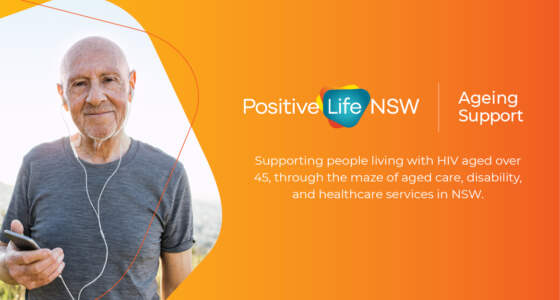As people living with HIV age, finding and getting help at home is a great idea. Working out what supports and services are available that you’re eligible for can be trickier than navigating a minefield.
30 years ago, HIV was considered a ‘death sentence’. It’s a modern-day marvel that now we get to live just as long as those without HIV. And just like them, ageing comes with challenges, if not more so.
We are in brand new territory with an ageing population of people living with HIV (PLHIV). In response, Positive Life NSW has rolled out an ‘Ageing Support Program’. I’ll explain more about this in a moment but first, let’s think about you and your health in terms of what you might want or need for your future.
As we age, most of us will notice some change or decline in our abilities, strength or overall health. It’s always a good idea to start planning for the future earlier rather than later.
Changes might come from a pre-existing condition that we’ve lived with a long time like diabetes or asthma. Other changes are recent or brand new after an accident, a new diagnosis or if you are on a wait-list for surgery and incapacitated for a while. Perhaps you’re not as active or mobile as you used to be and tasks around the house are becoming difficult. The sink might be harder to reach. Standing to cook or do the dishes might be difficult. The cupboard shelves grew taller overnight and suddenly the vacuum turned into a 30-tonne tank.
So, you utter to yourself “Bugger me! Now what?”
Domestic assistance is one of the most common needs as we age, and it means you can keep your independence at home for as long as possible.
By now, you might have heard about the National Disability Insurance Scheme (NDIS), or My Aged Care. There is also the Commonwealth Home Support Program (CHSP). These initiatives from the Australian government offer a cost-effective solution to keep people at home longer. Sounds great in theory, but the actual process is often daunting and feels like a maze.
First you need to be eligible, have the documents to back up your application, including letters from your GPs, social workers, etc. If you’re applying for Aged Care services, then you need to be assessed over the phone by the Aged Care Assessment Team (ACAT). If that part is successful, you’ll be assessed face-to-face at a location convenient to you, such as your home. You could be approved for a My Aged Care Package, or if your needs are less complex, the CHSP might be better for you.
Confused? Totally understandable. This is where our Ageing Support program could be useful to you.
The program offers you a peer, someone else also living with HIV, who can stand by you throughout this process of finding, applying and getting the support you need. We can talk about what you need and want, and together find out what programs, packages or solutions you’re entitled to get. That might be homecare support, healthcare services, financial or disability assistance or a combination of these.
We can help you find the way through the maze of services, overcome barriers or hurdles, and get the answers you need to stay independent for as long as possible.
We can help you with application forms, we can support you to find and lock in a service provider with you. We can make the calls, follow up the quotes, and negotiate appointment times to fit within your schedule. A Positive Life peer (who also lives with HIV) can be with you during the assessments so you don’t feel as though you are being pushed into something you might feel unsure of.
While we can’t rush waiting lists or force a provider to prioritise your individual case, we can follow up with them, keep your name on their radar and make sure you don’t slip between the cracks.
No matter which service you get, however long it takes to get it, if this means you keep your independence, it’s worth it.
If you want to talk about your eligibility or have questions, feel free to contact us here at Positive Life NSW on (02) 8357 8386 or 1800 245 677 (freecall). You can also email contact@positivelife.org.au







